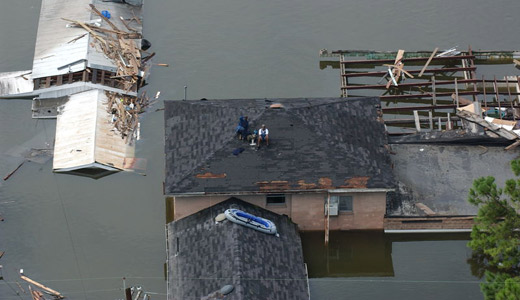
On Aug. 29, 2005, Hurricane Katrina slammed into New Orleans, leading to the worst natural (and also man-made) disaster in U.S. history.
Katrina flooded 80 percent of the city up to the rooftops of many houses and small buildings. Winds of 145 miles per hour cut power lines and destroyed homes. Entire neighborhoods, like New Orleans’ Ninth Ward, were devastated. Katrina caused record storm surges all along the Gulf Coast. The surges overwhelmed the levees that protected New Orleans, which is 6 feet below sea level.
Estimates are that Katrina caused more than 1,300 deaths and up to $150 billion in damages to both private property and public infrastructure, including New Orleans’ famous Charity Hospital. One million people were displaced by the disaster, a phenomenon unseen in the United States since the Great Depression of the 1920s and ’30s. Four hundred thousand people lost their jobs as a result of Katrina’s devastation.
The Bush administration’s response was widely assailed.
Working people of New Orleans and surrounding areas continue to struggle to rebuild their livelihoods and communities. Unions are part of that struggle.
Photo: In New Orleans, people sit on a roof waiting to be rescued a day after Hurricane Katrina hit. Jocelyn Augustino/FEMA

MOST POPULAR TODAY

High Court essentially bans demonstrations, freedom of assembly in Deep South

UN warns that Israel is still blocking humanitarian aid to Gaza

U.S. imperialism’s ‘ironclad’ support for Israel increases fascist danger at home


Resource wars rage in eastern Congo, but U.S. capitalism only sees investment opportunity






Comments